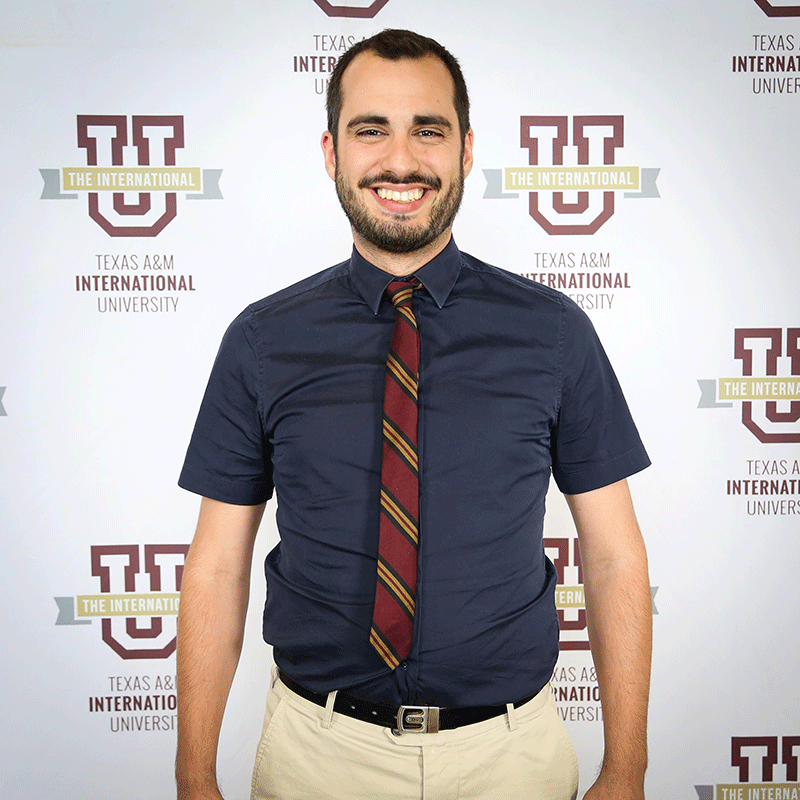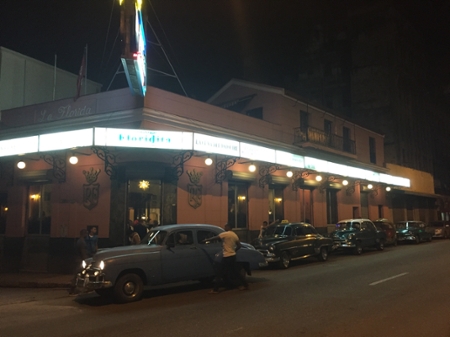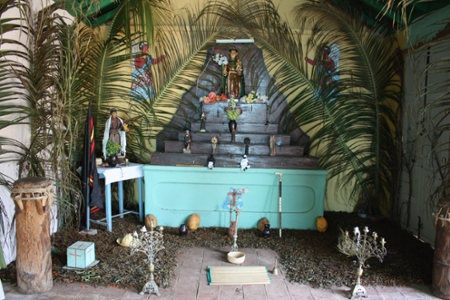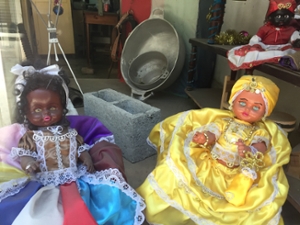Going Beyond: TAMIU Professor Reconnects with Past in Present Cuba

(This is an extended version of a story that first appeared in the University’s Annual Report 2016)
Sometimes, going home can be a first-time experience. This past summer, Dr. Aaron Alejandro Olivas, TAMIU assistant professor of history, reconnected with his family's history during a visit to Cuba while presenting at an international academic conference.
Dr. Olivas, whose heritage is Mexican-American and Spanish, was able to meet a cousin from his mother’s side of the family, part of a larger extended family that mostly left Cuba for the United States in the 1960s.

My trip to Cuba was very moving given my family’s connection to the island. My own family history and Hispanic identity are what first inspired me to become a historian, so you can imagine how meaningful this trip was to me. I was fortunate to visit Camagüey to see the house where my grandmother’s cousins lived. They subsequently lost it to the Cuban government when they immigrated to the United States in the 1960s. I visited their old parish church as well. Even though I no longer have family in Camagüey, I quickly bonded with the couple at my casa particular (private homestay), so I do in fact feel as though I left behind some primos there! They actually know the owners of our cousin’s old house and offered to contact him so I could go inside, but I did not want to impose.
I was also fortunate to find my cousin Rafael in Holguín, in the eastern part of the island. My grandmother Dolores used to correspond with him for years, sending him money for his basic needs. I could not help but feel it was my duty to visit him—part personal interest, part Spanish guilt. Rafael is my only living relative in Cuba, since the rest of the family has either died or left the island. Sadly, it is a common reality that the Cold War, the Revolution, and immigration in the late 20th Century have led to the division of so many Cuban families. As my cousin phrased it, this has left many ‘orphans’ on the island, such as himself. Thankfully, through the Catholic Church he has found a sense of community and belonging. In fact, it was one of the local Catholic priests that helped me find my cousin. In general, Cubans are very hospitable and willing to go out of their way to lend a hand even to strangers. I got to know more about my family’s experiences in Cuba through Rafael, including his participation as a young soldier in the Gran Zafra—the revolutionary government’s attempt to harvest ten million tons of sugar cane in 1970,” Olivas explained.
Central to Olivas’ visit was his participation at the conference, “The Slave Trade to Cuba: New Research Perspectives,” organized by the Universidad de La Habana and Harvard University. His presentation, “Trade and Politics of the French Compagnie Royale de Guinée in Cuba, 1702-1712,” delved into late colonial Spanish America’s transition from Habsburg to Bourbon rule and its relation to the slave trade.
While in Cuba, he also sought out opportunities to explore the role that Catholicism, an important aspect of Hispanic cultural identity, plays in contemporary Cuban society.

“It was fascinating to see just how widespread Catholicism is practiced in contemporary Cuba. This has not always been the case under the revolutionary government, but it is certainly the case today. Certainly, the resiliency of Catholicism in Cuba can be explained in both spiritual and cultural terms, as in other parts of Latin America. Still, I did witness more unique ways in which Catholic Cubans practiced their faith. I did expect (and appreciate) the blending of West-Central African spirituality into Catholic religious devotion, but I was also intrigued by the ways in which traditional Spanish practices such as the cult of the saints continue to be used by Cubans to help them cope with the pressures and uncertainty of the contemporary world. The tremendous quantity of ex-votos at the Basilica of Our Lady of Charity of El Cobre (outside Santiago de Cuba) offered a glimpse of this—objects such as baseball bats, music albums (recorded by Cubans abroad), military medals from Angola, crutches, and machetes.
“Catholicism also seems to be important to many Cubans because of its global dimensions. Belonging to the Catholic Church in a sense connects them to a larger global community that alleviates the sometimes-prevailing feeling of isolation in the island, while at the same time satisfying the natural Cuban fascination with the wider world. Cubans are very cosmopolitan in this sense, and quite interested in other cultures. The general religious plurality of Cuba was another surprise. I saw a number of other Christian sects in various cities, such as Jehovah’s Witnesses, Baptists, and even a Russian Orthodox Church in Havana. There is also a growing movement among young people—of all racial and ethnic backgrounds—to preserve or revive traditional Yoruba religious practices from West-Central Africa. These are sometimes blended with Catholicism in the form of Santeria, though not always. You can spot the leaders of these spiritual communities because they dress in all white. You can actually see many in any town on any given day,” he said.
Olivas also noted his conversations with international scholars became especially useful.

“My interactions with the group of international scholars at the Conference were quite useful for my book project in terms of revealing new perspectives about Cuba and Caribbean history. Creating a dialogue between scholars of Latin American, European, and African history is so essential to gaining a truly balanced understanding of Atlantic World history. This helped me realize my need to better understand the political history of West-Central Africa at the turn of the 18th Century, as the success of French slaving activities in Latin America would have depended not only upon the cooperation of Spanish imperial subjects, but also African merchants and coastal elites. I am hoping that as I further investigate the dramatic impact of the Bourbon succession on politics and trade in the Americas, I can also create a better understanding of its impact on the history of Africa. Learning more about 19th Century Cuba was actually quite useful in helping me realize how trends in early 18th Century continued through to the end of the Colonial Era. One of the major surprises I came to realize, thanks to a colleague, was the long-term impact of the slave trade in the expansion and success of Spain’s modern finance sector. European investment in the slave trade actually led to the first stable banking system in Spain—something that matures during the 19th Century, but has a notable precedent during the War of the Spanish Succession. In a sense, this mirrors Northern European economies of the same era, such as England, France, and the Netherlands. Though this is quite alarming from a 21st Century perspective, the institutions that fostered capitalism, dispensed loans and credit, and produced the rise of Europe during the Early Modern era were heavily dependent upon exploitative commercial ventures such as the slave trade. Spain is often left out of this conversation, but my research is proving that it was by no means an exception to the rule,” he noted.
Olivas said he is eager to share his experiences with TAMIU students and hopes to create a study abroad course in Cuba in the near future.